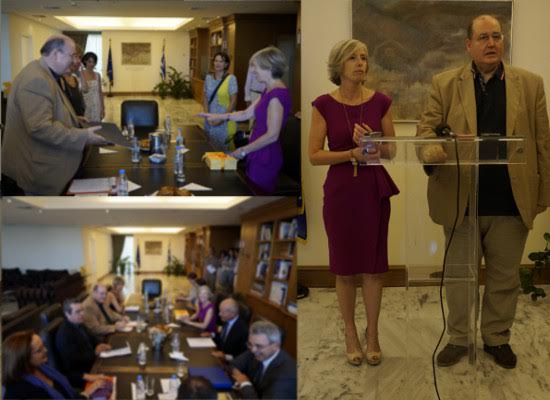
Filis, Italian education minister talks on migrant integration, cultural exchanges
Visiting Italian Education Minister Stefania Gianninia and Education, Research and Religious Affairs Nikos Filis discussed joint approaches to inducting refugee and migrant children in the Italian and Greek educational systems and societies, as both countries face heightened migrant flows, but they also agreed to pursue cooperative actions that will reinforce and expand on bilateral cultural ties.
Nios Filis underlined the longstanding historical and cultural ties between the two nations, and he noted that the two countries are exchanging ideas on how best to integrate refugee children in their respective school systems, as well as efforts to offer creative activities this summer which can begin the process of integration and meet the needs of migrant children.
“The refugee issue concerns all European countries, but especially the Mediterranean countries, which should coordinate in order to secure European [Union] decisions that can both meet the needs of refugees and address the causes of the crisis,” Filis said during joint statements at the education ministry in Athens.
Filis and Giannini also agreed to pursue initiatives to bolster Greek studies in Italy and Italian studies in Greece by creating a framework of joint projects. “The Greek people harbour sentiments towards Italy of deep friendship, built in large measure on the thousands of scholars and academics who have studied in Italy,” Filis said.
Giannini also agreed to develop bilateral cooperation between universities and research centres -– in areas from literature to technology - with Alternate Education Ministers Sia Anagnostopoulou (competent for tertiary education), and Costas Fotakis (competent for research and technology issues).
In her remarks, Minister Giannini said the talks focused on new practical initiatives to renew and deepen cultural ties, while addressing pressing concerns that both sides face.
She underlined that it is the deep conviction of both Italy and Greece that in its course Europe must confront the problem of migrant flows.
Giannini stressed that both Italy and Greece are primary gateways for migration, and hence they must both address a host of security and humanitarian issues, of which education is a top priority.
The Italian education minister said the two countries want to send a strong message to Europe on the need for open, culturally mixed schools, while offering creative activities that cater to both migrant children and the local children in the downtrodden neighbourhoods where refugees are often concentrated . Giannini stressed that both countries are dedicated to establishing open schools that can best integrate refugee and migrants children in society.
On the bilateral cultural level, the two ministers agreed to promote the teaching of Italian in Greece and of Greek in Italy, through cooperation between educational institutions and research centres. That includes exchanges of scholars and academics.
Finally, Giannini invited Filis to the future opening of the European Academy of Religion in Italy.
Giannini noted that 2017 marks the 1,900th anniversary of the accession of the Roman Emperor Hadrian, who loved the common cultural elements shared by Italy and Greece, and she said that this will be highlighted by school events that stress a message of reunion in the Mediterranean and Europe more broadly.
Nikos Filis closed the joint statements to the press by emphasizing the need for a more social and democratic union that expresses all peoples, without a revival of imperialism or nationalism.
